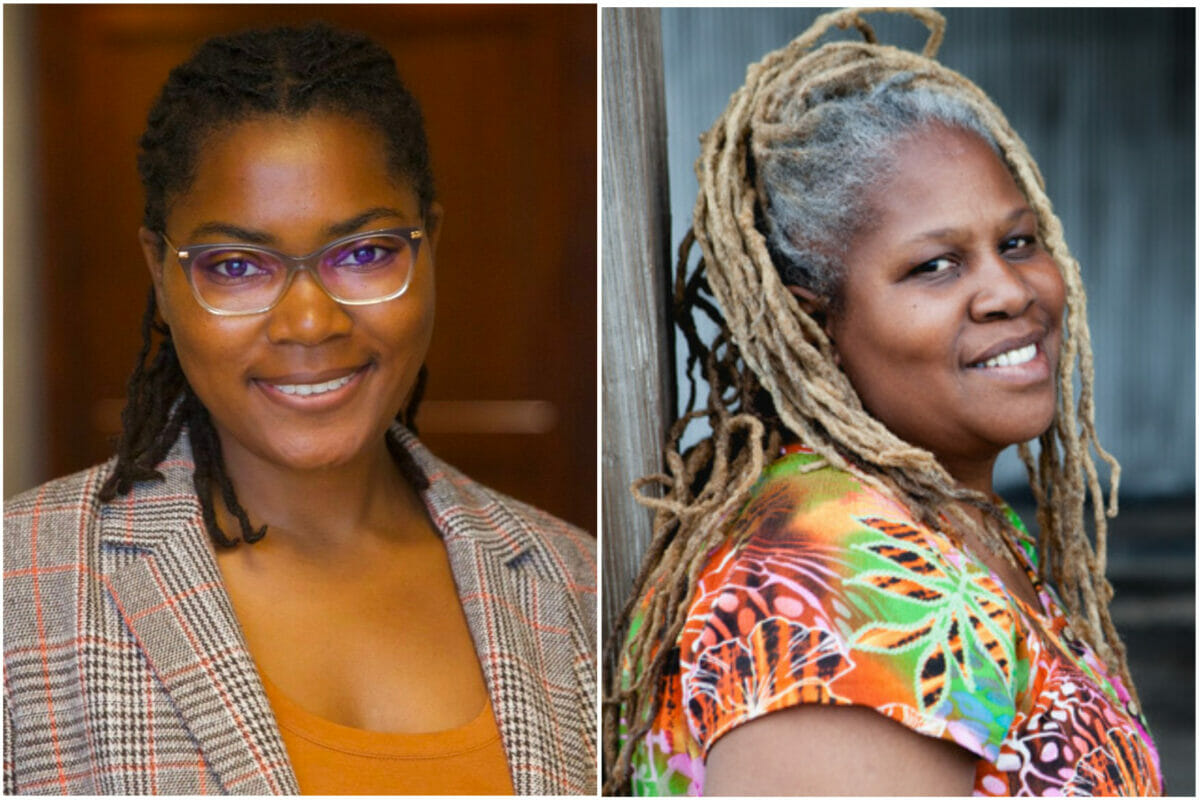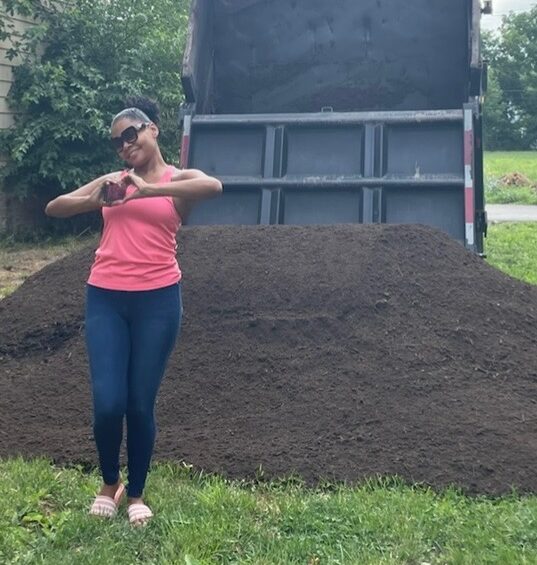This Organization Aims to Provide Black Farmers With Capital
The Black Farmer Fund is working to redefine wealth and health in New York communities by investing in Black agricultural systems.
This Organization Aims to Provide Black Farmers With Capital
The Black Farmer Fund is working to redefine wealth and health in New York communities by investing in Black agricultural systems.

Olivia Watkins and Karen Washington founded the Black Farmer Fund to help provide capital and resources to Black farmers.courtesy of Black Farmer Fund.
When farmer-activists Olivia Watkins and Karen Washington met at a conference in 2017, they recognized there weren’t any programs geared towards Black farmers that addressed their economic needs. So they set out to fill the gap.
“Farmers have one chance in a season to get it right. There were great organizations educating Black farmers, but there was not an organization pooling capital and giving it through a grant or a loan to Black folks to close the racial wealth gap,” says Watkins. “There’s no incentive to Black farmers to feed Black communities at all.”
While most people know that enslaved Africans were brought to America in order to do the hard work of building a country, perhaps it is less well known that not only was their physical labor desired but also their agricultural knowledge and skill in cultivating the land. After the Civil War, African Americans continued to grow crops either as sharecroppers or by owning the land they farmed outright—100 years ago, they made up 14 percent of the country’s farmers. Today, Black farmers represent only 1.4 percent of the industry.
The amount of Black farmers in the US has been on the decline for decades. According to the USDA, the number of Black farmers peaked in 1910, when they owned an estimated 16 to 19 million acres. That number has dropped to less than three million acres today.
Although there is a variety of factors for this decline, the major causes are systemic governmental racism and lack of access to finances.
Not long after their meeting, Watkins and Washington launched the Black Farmer Fund, which welcomed its first cohort of recipients this year. The fund provides capital and resources such as business coaching to Black farmers. The organization aims to build community power and wealth, while working to shift and change the way food justice happens.
It’s important work because, according to Watkins, the average income for an American farmer is $42,000 per year, while the average income for a Black farmer is -$906 per year. The economic disparity creates larger issues than just a lack of Black farmers. “This is why there is food apartheid in certain communities,” says Watkins. “This is why we are so disconnected from our food, because our communities are not producing food, and the ones that are producing are struggling.”
The Black Farmer Fund was especially meaningful during the pandemic, when Black farmers were hit hard economically. Watkins saw the need to create an emergency relief fund where farmers could access capital quickly. So they launched a special grant to pay down personal or business debt, assist with labor costs or purchase equipment and infrastructure such as greenhouses. “Farming is a challenging experience. There were a lot of emergencies happening in our community and we didn’t want people to dip into their investment capital,” says Watkins. Additionally, a rapid response fund for farmers who were not in the fund’s portfolio was created in order to distribute funding on a wider scale.

The level of thoughtfulness and dedication is part of what attracted farmer Denise Scott of 716CBD and Black House Growers to the Black Farmer Fund. Part of the first cohort of recipients that includes farmers, herbalists and collectives from across New York state, Scott compared the Black Farmer Fund staff to feeling like family. “As you start to meet people behind the scenes, you start to build up a family with them…Some of these people have stayed in my home,” she says. “We grew up in this as a family.”
Located on the New York side of Niagara Falls, Scott’s 716CBD is a holistic healing space where she makes and sells butters, tinctures, salts and scrubs. Her microfarm, Black House Growers, occupies just one-tenth of an acre, and every inch is covered with mint, chamomile, tomatoes, cabbage, celery, cucumber, peppers, kale and collard. She plans to add flowers and sweet potatoes, too. Ultimately, Scott wants to own 100 acres and give some of the land to the Black Farmer Fund. “It always goes back to the earth,” says Scott. “When you start talking about farm to table—that’s sustaining on your own.”
Scott has historical family ties to farming as well. Her father was a farmer in North Carolina, and when she started learning more and more about food justice and shortages, she knew she needed to start farming herself. “I started looking at Black people being able to sustain and how were we able to sustain prior to this. Everyone’s mother had a garden in the backyard,” she says. “I went back to what my ancestors did for centuries.”
The Black Farmer Fund’s first cohort also includes: Black Yard Farm Collective, a collective of Black farmers that creates space for the community to learn about farming; Trinity Farms, a small fruit orchard in Clintondale, New York; and Farm Fresh Caribbean Growers, which produces hard-to-find Caribbean produce in New York. In total, the organization provided funding for eight farms, and the growing demand for education about farming in local communities and the broadening of the agricultural space to Black farmers emphasizes that there is still more work to be done.
Even with all the obstacles that Black farmers face, there is still abundant hope. “Black farmers are incredibly resilient, gifted and talented people,” says Watkins. “There is that ancestral lineage of being agricultural experts and sustaining communities.”
Follow us

This work is licensed under a Creative Commons Attribution-NoDerivatives 4.0 International License.
Want to republish a Modern Farmer story?
We are happy for Modern Farmer stories to be shared, and encourage you to republish our articles for your audience. When doing so, we ask that you follow these guidelines:
Please credit us and our writers
For the author byline, please use “Author Name, Modern Farmer.” At the top of our stories, if on the web, please include this text and link: “This story was originally published by Modern Farmer.”
Please make sure to include a link back to either our home page or the article URL.
At the bottom of the story, please include the following text:
“Modern Farmer is a nonprofit initiative dedicated to raising awareness and catalyzing action at the intersection of food, agriculture, and society. Read more at <link>Modern Farmer</link>.”
Use our widget
We’d like to be able to track our stories, so we ask that if you republish our content, you do so using our widget (located on the left hand side of the article). The HTML code has a built-in tracker that tells us the data and domain where the story was published, as well as view counts.
Check the image requirements
It’s your responsibility to confirm you're licensed to republish images in our articles. Some images, such as those from commercial providers, don't allow their images to be republished without permission or payment. Copyright terms are generally listed in the image caption and attribution. You are welcome to omit our images or substitute with your own. Charts and interactive graphics follow the same rules.
Don’t change too much. Or, ask us first.
Articles must be republished in their entirety. It’s okay to change references to time (“today” to “yesterday”) or location (“Iowa City, IA” to “here”). But please keep everything else the same.
If you feel strongly that a more material edit needs to be made, get in touch with us at [email protected]. We’re happy to discuss it with the original author, but we must have prior approval for changes before publication.
Special cases
Extracts. You may run the first few lines or paragraphs of the article and then say: “Read the full article at Modern Farmer” with a link back to the original article.
Quotes. You may quote authors provided you include a link back to the article URL.
Translations. These require writer approval. To inquire about translation of a Modern Farmer article, contact us at [email protected]
Signed consent / copyright release forms. These are not required, provided you are following these guidelines.
Print. Articles can be republished in print under these same rules, with the exception that you do not need to include the links.
Tag us
When sharing the story on social media, please tag us using the following: - Twitter (@ModFarm) - Facebook (@ModernFarmerMedia) - Instagram (@modfarm)
Use our content respectfully
Modern Farmer is a nonprofit and as such we share our content for free and in good faith in order to reach new audiences. Respectfully,
No selling ads against our stories. It’s okay to put our stories on pages with ads.
Don’t republish our material wholesale, or automatically; you need to select stories to be republished individually.
You have no rights to sell, license, syndicate, or otherwise represent yourself as the authorized owner of our material to any third parties. This means that you cannot actively publish or submit our work for syndication to third party platforms or apps like Apple News or Google News. We understand that publishers cannot fully control when certain third parties automatically summarize or crawl content from publishers’ own sites.
Keep in touch
We want to hear from you if you love Modern Farmer content, have a collaboration idea, or anything else to share. As a nonprofit outlet, we work in service of our community and are always open to comments, feedback, and ideas. Contact us at [email protected].by Debra Freeman, Modern Farmer
November 5, 2022
Modern Farmer Weekly
Solutions Hub
Innovations, ideas and inspiration. Actionable solutions for a resilient food system.
ExploreExplore other topics
Share With Us
We want to hear from Modern Farmer readers who have thoughtful commentary, actionable solutions, or helpful ideas to share.
SubmitNecessary cookies are absolutely essential for the website to function properly. This category only includes cookies that ensures basic functionalities and security features of the website. These cookies do not store any personal information.
Any cookies that may not be particularly necessary for the website to function and are used specifically to collect user personal data via analytics, ads, other embedded contents are termed as non-necessary cookies.
“the average income for a Black farmer is -$906 per year” That stat. blew my mind! Kudos to these ladies and everyone else who are working to address this disparity.
I’m really interested
We need to support ALL farmers, black, white, green, blue and purple. If they don’t grow it, we cannot eat it.